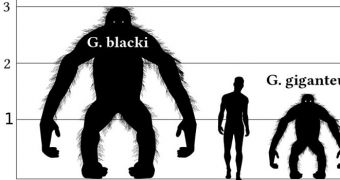According to the conclusions of a new scientific paper published in the journal Quaternary International, it would appear that the largest-known ape that ever lived on our planet, called Gigantopithecus, disappeared due to a lousy diet that contained very few nourishing substances.
The first hints at Gigantopithecus were discovered by Dutch anthropologist Gustav Heinrich Ralph von Koenigswald some eight decades ago, after he came across a very large tooth. Thousands of these teeth, plus three jawbones, have been discovered since, revealing the existence of a 3-meter (10-foot) tall ape on our planet around 400,000 years ago.
Scientists have been speculating on the reasons that led to these apes' demise for many years, but the new research suggests that the diet these animals ate on a regular basis may have had something to do with it. Scientists with the Chinese Academy of Sciences in Beijing say that many of the Gigantopithecus teeth discovered to date were eroded.
Available data indicate that at one point the giant apes turned from eating bamboo to less-nutritious fruits, which were rich in enamel-eroding acids. This explains their poor oral hygiene, Chinese researchers explain, quoted by NewScientist.

 14 DAY TRIAL //
14 DAY TRIAL //